Exponent II's Blog, page 122
January 31, 2022
The God of Hagar, Part 1
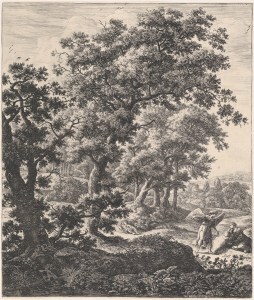
Hagar Consoled by the Angel,
17th century,
Anthonie Waterloo
I love Hagar. The Old Testament is full of dramatic stories of difficult situations and Hagar is right in the middle of one. She was the enslaved woman that Sarai gave to Abram so that Sarai could have posterity. To frame why Hagar’s story tugs my heartstrings so strongly, I first want to tell a tender personal experience:
I was deep in the well of grief. My muscles ached from the hours I spent curled up on the couch. My safety net of support felt very threadbare—there had been a massive exodus where most of my closest friends, neighbors, and ward members moved away. And I was newly pregnant. I was often mentally and emotionally exhausted, doing the bare minimum of what I needed to do. There was one day that I forced myself to exercise for just five minutes. Doing that would at least allow me to feel like I had accomplished something that day. It took a gargantuan amount of effort to start and complete my “workout”. Afterwards, I was laying on the floor utterly drained, weeping from the effort. I thought about some of my friends who have dealt with depression. I thought about how proud they would be of me for doing something to take care of myself. I thought about how they would understand how much effort that took me, even though their life experiences were nothing like what I was currently going through. And then I thought about Jesus and the atonement. Whatever he experienced in the garden of Gethsemane was not exactly like what I was going through, but maybe it was an experience that allowed him to have perfect empathy with what I was facing. The thought that someone could completely understand what I was feeling brought me a deep level of peace and comfort. This incident has shaped my understanding of the gospel in profound ways that, even years later, I feel I haven’t fully explored.
The first time I encountered the story of Hagar after this experience was in Institute, when we were talking about Sarah. I was excited to read the scriptures with special consideration for a faithful matriarch of the Old Testament. (That’s how we tend frame things at church: the prophets and their wives are always amazingly faithful.) However, when I read through the story this time, the actions of Sarai and Abram disgusted me. I connected with Hagar’s story. In Genesis chapter 16, Sarai gives Hagar to Abram. Hagar quickly gets pregnant, and that swiftly strains the relationship between the two women. At some point, Sarai was so harsh that Hagar runs away.
Hagar is alone in the desert and resting at a well when an angel of the Lord comes and talks to her. He tells her that she needs to return to Sarai. (At first, I thought this sounded horrible, telling a slave to return to an abusive household. But the desert is also harsh, and this was probably solid advice to keep her alive.) The angel tells her that she will have a son and countless posterity. He tells her that she should name her son “Ishmael”, meaning “God hears”. He tells her that raising her son will not be easy. At the end of this experience, Hagar says “You are the God who sees me.” She named the well that she was at “the Well of the Living One who sees me”.
When I read Hagar’s story, I was struck with two thoughts:
how similarly we both experienced God. In our painful, isolated hour, we both felt seen by God.
how rarely that has happened to me while reading the scriptures.
The way she named God as the “God who sees me” feels powerfully right. I realized that Hagar’s experience qualifies her for the titles of prophet, seer, and revelator: she talked with God, she saw into the future, she told others about this experience. I’m so glad that someone listened to her and wrote it down. The God of Hagar is the God who saw her pain and suffering, the God who told her “You can do this hard thing”, the God who says “I hear you”. This is the God that I have experienced too.
January 30, 2022
What Doesn’t Kill You. Hurts You: Tales From a Covid 19 Long Hauler
In 2011, Kelly Clarkson introduced the smash-hit Stronger to the world. With its sassy chorus and infectious beat, it fast became a legendary anthem for millions around the world in need of much-needed pep talk.
When the song hit Barbadian airwaves, I was in much need of a pick-me-up. At sixteen, I had already faced more uncertainty surrounding my health than most had ever considered. Instead of prepping for college as was customary for most after graduation, I spent my days being shuttled to doctors’ appointments in hopes of discovering what had suddenly impacted my health.
As the years pressed on, the song became lodged in my brain following each appointment, protecting me against the hurt at the negative results following each round of vigorous testing.
While lupus and I became friends over the years, Covid-19 and I were mortal enemies from the start. In the early days of the pandemic, “spoonies” were advised that contracting the unpredictable disease would mean certain death.
In those early days, the paranoia surrounding the disease amused me. With Barbados in a total lockdown, the possibility of the virus ever coming to our shores seemed impossible. Directives protected and challenged us as the island dealt with the new realities which Covid-19 had brought to the world.
I held a misplaced sense of entitlement for a year as I avoided the grip of the pandemic. Eventually when Covid finally visited my island for its extended vacation, the “bubble of safety” I had constructed in my head burst.
Soon, life fell into a routine of mask-wearing, sanitizing and fear.
Fear ruled my days as my time outside my home became less frequent. As an immuno-suppressed person, the gamble for moments of freedom was pointless. Life continued around me but mine seemed to come to a complete standstill as I submitted to the “hermit life” that would ensure that I did not contract the disease
For almost a year, I lived in the reality of enclosed spaces with only small trips each week to church and back. Trips to the grocery store were left to my parents with healthier immune systems.
In my own naivety, I began to lapse while accepting the new reality. While I continued to isolate at home, I craved the outdoors with each passing day as I watched from my window. Behind the masks, everyone seemed to look happy. Even with the economic hardships Covid-19 had brought, I still could detect smiles behind masks.
While my family and I took every precaution to protect ourselves, we did eventually contract Covid-19, on the one day I left my home in almost six months almost a year into the pandemic. For almost a week, I remained oblivious to my diagnosis. In my mind, I had done everything right.
I had sanitized.
I had social distanced.
I had worn a mask.
What I hadn’t done was to remind my mother to wipe her debit card at the grocery store.
When my mom started coughing, Covid-19 never seemed to enter my brain. As chronic asthma sufferers our entire lives, it was common to hear someone in the Morris family coughing or sneezing. Still, as the days continued the coughing got worse.
Eventually, we discovered we had been exposed to Covid-19 and cautiously yet optimistically went to the testing center. While there, I joked and laughed with the staff who performed the test. In my mind, there was no way that Covid-19 was in my body. For the most part, other than a pesky lupus rash from sun exposure I felt fine.
A day later, my immune system hit the wall, landing at my feet like an angrily discarded meal in the middle of a food fight.
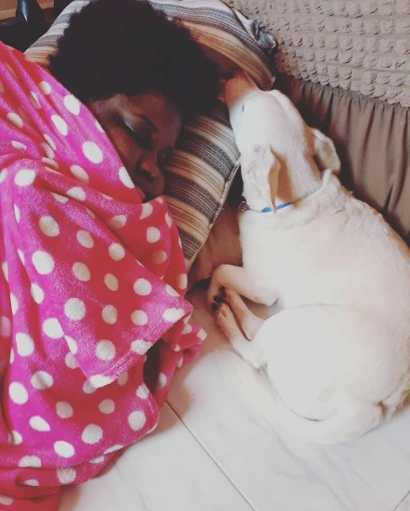 Burning up with fever, my dog Muffin became my “caregiver”. I was too sick to lay in bed…too sick to sit upright…too sick to care for myself. Yet, Muffin wanted to take care of me.
Burning up with fever, my dog Muffin became my “caregiver”. I was too sick to lay in bed…too sick to sit upright…too sick to care for myself. Yet, Muffin wanted to take care of me.What followed was two weeks of hell, wrapped in pretty bows and expensive packaging. The disease sent my lupus into a pseudo-remission as it destroyed my body from the inside out as each day brought me closer and closer to what I could only consider as an Earthly Hell.
Still, living in Naivety-land, I considered that I would only be bound to fourteen days of hell. I prayed and prayed for relief, propped up on pillows to keep my air-passages open or sleeping on the floor as my body was racked with fever.
Even when I had recovered enough that Covid-19 was no longer detected in my system, the long-term effects were present. I could no longer eat without feeling immense pain. I had horrible anxiety (and still do) which nearly led to me ending my own life. Fatigue, rashes and jaw pain all followed as a result of a disease that until a few years ago, had never been a factor in my life. For months, it was impossible to sit upright which resulted in me dropping out of BYU-Idaho for two semesters.
For the second time, I mourned my health as I continued to deal with the impact Covid-19 brought to my life. There are still some days even after a year has passed since the initial diagnosis that leaves me bedbound as my body fights the lingering laundry list of after symptoms.
Still, I am fortunate.
I have life. I have my family who fought through Covid-19 and came out on the other side.
I value life more knowing what I have gone through. Having such a horrible disease has taught me so much about boundaries and new self-preservation techniques that allow me grace and time to recover.
Even as I write this blog post which took two days as I fought off vertigo, I am grateful for Heavenly Father’s grace to see his children through the storms of life and for my ability to endure with gusto in my own sassy way.
Because eventually, we all discover that what doesn’t kill us ends up hurting a little. Still, we embrace the scar, plant our heels into the dirt and fight against the forces that seek to destroy us and become our own version of a superhero.
-Momo.
January 29, 2022
The “Best Books”: Summer 2022 Call for Submissions
 Photo by Eugenio Eugenio Mazzone on Unsplash
Photo by Eugenio Eugenio Mazzone on UnsplashIn D&C 88:118, readers are invited to seek “out the best books” and to “seek learning, even by study and also by faith.” Beyond scripture, what books have shaped your life or impacted your spiritual journey?
Do you have a childhood book that shaped your world, or maybe one that you re-read as an adult with a totally different view? What about a protagonist (or antagonist) who changed the way you experienced gender expectations? How has a certain book changed your life, and what characters have followed you through a time of crisis? When has strong disagreement with a book clarified your own beliefs? You are welcome to reflect on your relationship to books of scripture but also any book, no matter the genre or form, so long as you anchor your story in your lived experience.
Submissions should conform to the mission of Exponent II and follow the submission guidelines. They can be up to 2,400 words (with 1,400 words often being the sweet spot). Send us your work by April 15, 2022.
January 28, 2022
In Memoriam: Kris Treviño Irvin
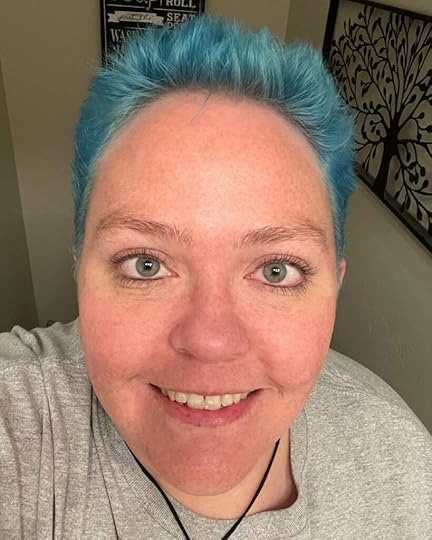
Kris Treviño Irvin
We at the Exponent are devastated by the death of Kris Treviño Irvin. After an unspecified medical emergency and a short time on a ventilator, Kris passed on Sunday, January 23, 2022, at the age of 35. They are survived by their son, Toby, and many other family members and loved ones. Read their beautiful obituary here.
Kris was a friend to so many in this community and, as the Cougar Pride Center phrased it, a queer icon. Through their advocacy, humor, and love, they were a source of goodness, both in-person and on social media. The Exponent was honored to host their guest post in 2018, “A Letter to President Oaks.” Courtney Tanner at the Salt Lake Tribune wrote a lovely article about Kris’s impact on the LDS LGBTQ+ community.
Kris’s funeral will be held on Monday, January 31 at 9:30 am. It will be live-streamed, and this post will be updated with the link when it is made available. Following the funeral, there will be a short graveside service in Ogden at 11 am. It will not be streamed, but people are welcome to attend the graveside service held at Lindquists’s Memorial Gardens of the Wasatch, 1718 Combe Road, South Ogden, UT 84403.
A memorial in is the works, possibly to be held on Saturday, February 12. Details of the memorial will be updated here when made available.

Kris Irvin with Blaire Ostler, Peter Moosman, and Katherine Herrmann, holding sings offering hugs outside of General Conference in April of 2019.
From Nancy Ross:
I followed Kris on twitter for years and they posted updates on their life, photos, memes, and funny things continually. Kris was always extended gracious invitations to engage with and learn about LGBT+ folks, especially the trans and nonbinary communities, and was a source of loving queer support for so many queer Mormons and former Mormons. I miss their constant gentle reminder that the heart of the gospel, even in turbulent times, is love.
On behalf of Mormons Building Bridges, where Kris was an administrator:
Kris’s Eyes
That’s what I think of first. And then possums and jokes and Jedis. But first, their eyes.
Gentle, they would tear up while holding a friend in need.
Fierce, they would spark while defending a child.
Wise, they would wait patiently for others to catch up.
Kris’s eyes, and all the gentle, fierce wisdom they guided me with, will be my focus and my meditation as I learn to keep Kris close while letting them leave.
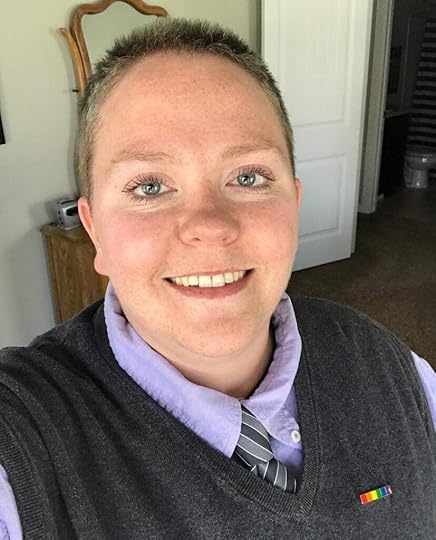
From Abby Hansen: Kris on their way to church, dressed in masculine clothes and attending Relief Society – trying to find a place to fit in. We have to do better, in all areas of our lives (especially in our religion) to find a seat at the table for everyone.
From Violadiva:
In their too-short life, Kris faced rejection from many different people and community spaces while also being loved and included in others. In spite of the cruelty and rejection they regularly faced, Kris kept an open heart to receive the love from those who adored them. When shown love, acceptance and appreciation, Kris’s generous heart bloomed, and they reciprocated with kindness and love in return. One of the things I admire most about Kris was their ability to be open to those who loved them and not shut themselves down to all love and generosity just because of the bad actions of a few jerks who treated them poorly.
Kris always had love to give, and asked nothing more than our love in return. I will always remember with tenderness the times Kris asked for and accepted my blessings. They had a quick wit and ready compassion, a charming sense of humor and excellent pop culture references. Our last few communications were about knitting and the awkwardness of using double point needles. I will miss them now that they are gone, and will always think of them as I round the crown of a knitted beanie hat.
From Risa:
I never met Kris IRL, but got to know them through social media, and was always aware of their impact on their community, especially the LGBTQ+ community in Utah County. I remember the bravery Kris faced with living their truth and reconciling that with their faith in the Gospel and the Church. Kris was so courageous to get a mastectomy in the face of bullying and opposition from their ecclesiastical leaders. They were a light and an example to others aching to express their gender identity. More than that, Kris gave so much love and comfort to those in need. They always had a kind word or deed at the ready for anyone who needed it. They were funny! They exuded laughter and sunshine. Their inherent goodness shined so bright it lit up social media and all who knew them personally. My love is with all those who were impacted by Kris’s life, and especially their dearest Toby. God be with you ’til we meet again, Kris.

Kris and their son Toby before a Pride Parade
From Jody England Hansen:
It is hard to believe they are gone.
It is hard to remember exactly where I first met Kris in person. We had interacted in several online groups, involved in advocacy.
And then I got to meet them in person. Their love, and generosity, and joyful passion for life, their own as well as all others, was so tangible.
It might have been an Affirmation gathering or conference, or an event at Encircle House, Mormons Building Bridges marching in the Pride Parade, holding their “Hug a Transgender Mormon” sign in front of the Conference Center, or Provo Pride Festival when we appreciated raising awareness of God’s love for everyone while in the shadow of the Provo City Center Temple, gathering for rallies at the State Capitol – there were many opportunities to show up and support LGBTQ+ issues and advocacy. Once I had been blessed to meet Kris in person, it seemed as though each gathering was another chance to build on that blessing.
One Sunday, I was able to see how limitless their compassion and advocacy was. It was after the horrible mass shooting at a mosque far away. So many died because someone could not handle the existence of anyone they did not agree with. Many of us wanted to do something affirming in the face of such hate. We invited all who would to gather at a mosque in Salt Lake, and be present in solidarity with those in the Muslim community who were reeling from loss and hurt. I made a sign that said “The God in me sees the God in you”, and we went to stand with others outside the mosque, hoping to surround the worshippers with love and hope. It was moving to see the entire area around the building full of supporters, quietly standing and holding messages of support. At one point, several people were invited to share some thoughts, and that is when I saw Kris step to the microphone and share their love, and concern, and faith, and wisdom. It did not surprise me that Kris would be there for those who had a different belief and views, but who shared a very human experience that Kris deeply understood. Kris was there to do what their deep love led them to do.
Kris was such a profound, loving and powerful presence in the world. We are poorer for the loss of them. I hope we will turn to their words, and writings, and memories of them, and continue to be inspired by the blessing of Kris’ life.
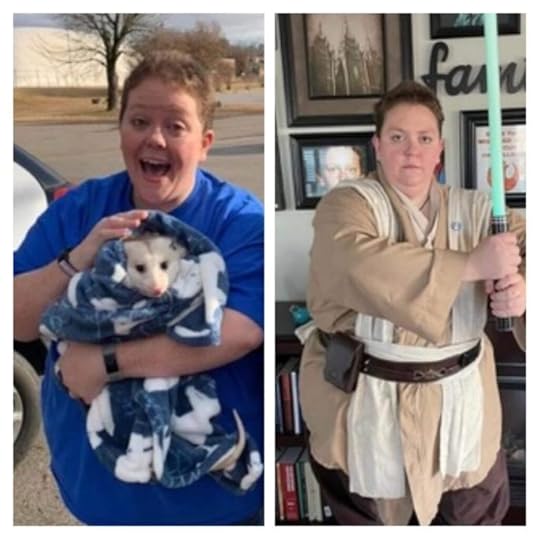
1) Kris holding a possum 2) Kris dressed as a Jedi Knight
From Katie Rich:
My heart goes out to Toby and all of Kris’s loved ones at this tender time. There is so much that I loved and appreciated about Kris, but one thing that stands out to me is how open they were about the things they were into—possums, Star Wars, Lilo & Stitch, Disney, cats, and more. They openly loved who and what they loved, and despite immense opposition, they never stopped trying to be more of who they were. They advocated for the LDS LGBTQIA community, but also for all people who are oppressed and marginalized. They were the best of us and I will miss them immensely.
From EmilyCC:
Kris had the unique ability to help someone feel loved through Facebook. They were a valuable support, as we messaged and talked about the dark days of depression and the courage to try another treatment. I am so grateful that they were in my life, and I mourn and feel angry that they are gone.
The love and pride they had for Toby, the care and concern they showed members of our Exponent II Facebook group, and the joy they shared with pictures of kitties and/or possums or Star Wars memes or just anything they found delight in was palpable. Did so many of us not get to meet Kris IRL? It’s true, but the connection so many of us feel to them is real and beautiful and one that I will treasure.
Kris will always be a bright light, not in spite of the darkness of the world, but because they knew it so well and still found ways to share love and compassion.
From Abby Hansen:
I originally met Kris twice before they remembered that we’d already met. That was fine by me, because I wasn’t nearly as cool or memorable as they were. The first time I went to the Pride Festival in Salt Lake City I met Kris on summer break from their classes at BYU, with a short spiky haircut dyed bright blue. They told me they could only be wild and dye their hair when BYU wasn’t in session.
I met them again at another Pride Festival and said, “Hey, I remember talking to you last year!”
Then another year passed and there was an article in the newspaper about Pride flags being stolen in Provo. I made a comment on a thread filled with hateful homophobic and transphobic remarks. I mentioned in it that I was going to Provo Pride the next day and Kris told me how much they liked my comment and hoped to meet me at Pride the next day. I wrote back and said, “Ha! I’ve actually met you twice already!” The next day at Pride I was there too early to see Kris at their booth, but as I got in my car to drive home I thought about giving their booth another shot. I parked illegally with my tired kids in the car (I couldn’t convince them to walk back across the festival with me) and sprinted back inside to the Genderbands booth where Kris had just arrived for their shift minutes before. I said, “Hello, do you remember me yet? Let’s take a picture together to commemorate you finally remembering me!” Then I ran back to my illegally parked car with whining kids inside, thinking how bad I wanted to be friends with Kris. I loved everything about them. I was a Kris fan from moment one. (I am not alone in this. They were a hero to basically everyone. If I am even half as popular when I die, I’ll know I was incredibly loved.)

Fom Abby Hansen: Kris’ blue haircut that made me pick them out of the crowd the first time we met. (I think I approached them in the middle of Washington Square and said, “Your hair is cool!”, making me a Kris stalker from Day One.)
After that, we finally became real friends. We met for lunch and they told me about growing up trans and asexual, getting married and the traumatic birth of their only son. I looked at Kris and thought, “This person is one of my favorite people I have ever met. I don’t even deserve their friendship but they’re so nice to me anyway!” Who was I? I was straight, privileged, and fit gender norms. I liked makeup and dresses and being called “pretty”. Kris wasn’t like me in that way, but they were like me in every way that made them one of my favorite friends. They understood what it was like to be pregnant and have a baby, but they also had masculine traits that I admired and loved. They were the first trans/non-binary person to let me know them so well, and everything inside was the perfect human I wanted to be like.
Kris was very well known in the local LGBTQIA/LDS community, and they spoke out to educate others and shared their experiences so openly. They were a gifted writer with impeccable sense of humor, and they emanated love and compassion at every turn.
And this sounds silly, but Kris was so involved with helping so many people in the LGBTQIA community that I felt super lucky they’d have time to be my friend when I was just a boring straight cisgender person. Like, who am I to be cool enough to be their friend when they are literally one of the most popular and loved queer people around?
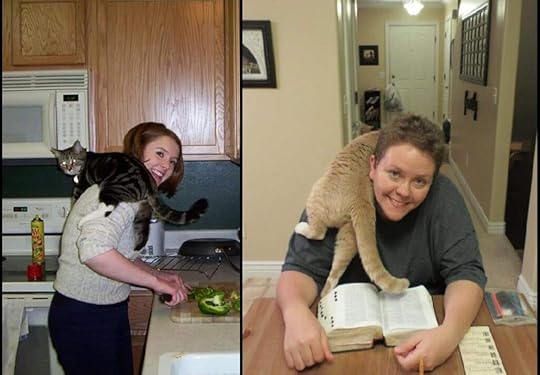
From Abby Hansen: Other than they were queer and I’m not, Kris felt more like me than almost anyone I’ve ever met – as proof, how many of YOU have pictures of your younger selves just chilling with a cat draped across your shoulders during dinner prep or scripture study? Kris was my favorite. I will miss them forever and I will do everything I can to keep their words alive.
Yet we had so much in common. We loved cats, and we even adopted sibling cats a couple years ago. Their sense of humor felt so much like my own, we loved reading and writing, we were both Mormon stay at home moms (though they were trans, and I wasn’t), we’d had laser eye surgeries, loved girl scout cookies, loved Pride Festivals, and loved my dog Macho. We went and watched Cats together the last day before it left theaters and made friends with another pair of friends there doing the same thing as us (and we talked and yelled out about the parts that were crazy to each other). We made plans to see another movie together shortly after (it was Little Women), but the pandemic hit hard within a few weeks and with all of Kris’ chronic illness they quarantined and we postponed our lunches and movie dates for the foreseeable future. We thought it would pass in a few weeks and we’d hang out again. (Damn it, covid!)
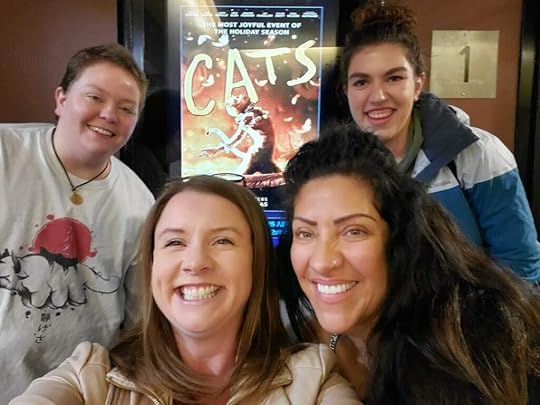
From Abby Hansen: The day that we went to Cats together, with the only two other people in the theater with us.
I’d heard the analogy of transgender people being like the sunsets and sunrises of humanity – while most of the time it’s either day (which can be beautiful) or night (which is also beautiful), the most breathtaking moments are during the in-between when it’s some of each. Kris was the most beautiful sunrise, one that is gone, but that thankfully we took a lot of pictures of to remember them by.
I don’t know how to explain Kris to people who won’t ever get a chance to meet them. They were just truly one of the best human beings to ever walk this earth. We are all better off for them having been here, and we are all going to feel the giant hole they’re leaving behind for a very long time. I’m so grateful for the few years that I got to be their friend, and I will see them in every LGBTQIA youth who’s trying to figure themselves out. Their influence sent ripples out that will be felt long after the rest of us are gone, too.
Rest in Peace, Kris. You will always be my hero.
Abby’s 2019 post, “Our Church Needs More Transgender Members,” includes a tribute to Kris.
Avoiding Contention Is Not the Higher Law

Due to pre-existing medical conditions, I am at a higher risk of serious complications or hospitalization from COVID-19. Thankfully I live in a country with mandatory public masking and an extremely high vaccination rate (over 90%). My branch is currently meeting in person with an online Sacrament broadcast for those who cannot attend at the chapel. Given that we live in a country where vaccine passes are standard and required for everything from restaurants to workplaces, I asked local leaders if they would consider a monthly service with stricter COVID-19 mitigation protocols including a vaccination requirement to make it safer for vulnerable members like me to return.
These leaders ultimately decided my suggestion was too politically controversial and that unvaccinated members might find it offensive, even though they agreed with me that it shouldn’t be. Later, they announced over the pulpit during Sacrament that we should wear masks but not confront other members by asking them to put on their masks. Several district and branch leaders have also expressed a desire to remove broadcast options as much as possible to encourage people to attend in person. These leaders’ approach is anything but neutral: by prioritizing the comfort of those who reject basic public health precautions, they have excluded people like me.
This decision has real consequences: I do not have a Priesthood holder in the home and have to arrange for administration of the Sacrament separately. (The leaders withdrew blanket authorization for administration of the Sacrament at home during the pandemic despite rising cases, of course, but made an exception for me.) I have a key Relief Society calling but cannot attend Relief Society. As a result, other sisters have to assist me with some of my responsibilities that cannot be done remotely, such as taking attendance. I have resigned myself to the fact that for my whole two-year stay in South Korea I probably won’t be able to attend church even once because I cannot do so safely.
This is not my first encounter with the specter of potential contention to be avoided in this branch. Our branch includes many singles and mixed-member families without opportunities for Family Home Evening or Come, Follow Me discussions outside of Sunday meetings. I had informal conversations with many of those members who yearned for deeper discussions beyond the sanitized provided materials that were devoid of reliable information about theological debates and historical controversy. As a result, I offered to co-lead a monthly virtual one-hour Family Home Evening for adults in my branch. We would discuss the Come, Follow Me lesson but focus on critical analysis and deep, philosophical conversations including on challenging topics. Anyone would be welcome to bring thoughts, questions, and concerns.
However, I was told our local authority “was a bit hesitant as it would need to be conducted in a way that is conducive for healthy conversations and topics that would not cause controversy” and suggested the supervision of a Branch Presidency member. I responded that I would rather scrap the whole idea than “not cause controversy.” The experience reminded me of the words of Amy Isaksen Cartwright in the 40th anniversary issue of the Exponent II magazine:
“Questions beget questions and I soon found myself longing to discuss the more complicated issues surrounding faith in the journeys that it takes us on. Church meetings and associations were for sharing uplifting, faith-promoting stories and for restating words that had come before through sanctioned sources, almost exclusively the voices of men. There did not seem to be room for asking the questions that have no answers, the questions that are such a part of our being that they need space to dwell or they will overcome us….And so, I needed to find other sources and places to have these conversations and continue to taste of the forbidden fruit of vulnerability.”
I am convinced that avoiding contention is almost never the higher law. The Savior never chose to avoid contention when there was an opportunity to minister to the most vulnerable, testify of God, or stand up for righteousness. We have countless examples in our Scriptures of courageous children of God facing difficult choices between conflicting commandments and making the necessary sacrifices to follow the higher law – starting from the beginning with Eve’s decision in the Garden of Eden. We should follow her example.
TopHat hit the nail on the head in her recent post, “Contention”: “We need to discuss the hard stuff in life. We have to challenge things. Putting in that energy and effort demonstrates our commitment to the relationship. This pertains to personal relationships as well as our relationship with our ward, our community, our world at large. Have the hard conversations; contention can be a sign of commitment.”
I yearn for the day I can rely on local and global church leaders to challenge things. Until then, I’ll take spiritual solace in those institutions and relationships that are committed enough to have the hard conversations.
January 26, 2022
Eliminating Needless Gender Barriers: When Can Girls Pass the Sacrament Already?

My nephew, a nice kid by all accounts, turned 11 on December 28th. Less than a week after his last day of being 10 years old, he was given the priesthood.
January is now the season of priesthood ordination. It used to be that a boy’s advancement in priesthood offices coincided with his birthdays (12, 14 and 16 for Aaronic offices), but that all changed three years ago when the Church announced that boys could now be ordained at the beginning of the year that they turned a milestone age instead of waiting for their birthdays.
Several years back, I read through the duties for each priesthood office, and it became obvious to me that ordaining boys to Aaronic priesthood offices at 12, 14, and 16 years old, let alone ordaining children at all, was not scripturally or doctrinally supported. [1] The leaders of the Church apparently also came to the conclusion that there’s nothing inherently magical about the long-standing but arbitrary age requirements for priesthood advancement, so they shifted them, removing the barrier of boys being an exact age to be ordained to Aaronic priesthood offices.
The Church rolled out another change for priesthood holders recently, tucked in the long list of Church Handbook revisions in December 2021. To perform a baptism, a male has always been required to hold at least the office of Priest; to perform a confirmation, he must hold Melchizedek priesthood. In the temple, however, proxy confirmations were only allowed to be performed by endowed Melchizedek priesthood holders. The December 2021 revisions to the Handbook removed that barrier, now allowing unendowed Melchizedek priesthood holders to perform confirmations for and in behalf of the dead. This change makes sense: the barrier for unendowed men wasn’t doctrinal or scriptural. Removing needless barriers is generally a good thing.
While I’m glad for the relatively small number of unendowed but temple attending men that this minor change will benefit, I’m also frustrated by this change because it shows that church leadership really does go through current policy with a fine-toothed comb to determine which policies and barriers are no longer necessary–and yet they do not make changes to remove countless barriers placed upon women and girls that are not scriptural or doctrinal. [2]
Let’s talk about one specific piece of low-hanging fruit. It is explicitly against doctrine for deacons or teachers to administer the sacrament: “But neither teachers nor deacons have authority to baptize, administer the sacrament, or lay on hands” (D&C 20:58), but teachers and deacons set up and pass the sacrament every week. Clearly, then, these actions are not part of administering the sacrament and are not included in the prohibition on anyone save a priest or elder taking part. And there’s precedent: before disposable cups, women helped set up and clean up the sacrament. And in 2018, in response to press about a few congregations where young women were permitted to carry sacrament trays into the mothers’ lounge for nursing mothers to partake of the ordinance, a church spokesperson said,“It is appropriate for a sister to assist by carrying the sacrament tray into the mother’s lounge, just as it is common for members to pass the sacrament tray to one another in the chapel.”
Clearly, the church sees no substantive difference between passing a tray to one’s neighbor down a full row and standing up and walking down a mostly empty row to pass a tray to people sitting at the opposite end and carrying a tray to pass sacrament in the mothers’ lounge. How are these things, which the church deems acceptable, any different than carrying the trays down the aisles and between rows?
The answer, of course, is that they’re not. There’s no scriptural or doctrinal reason why girls can’t pass the sacrament, and there’s no real difference between carrying a sacrament tray to women in the mother’s lounge and carrying a sacrament tray between rows. There’s also no justifiable reason why girls can’t stand at the doors during the sacrament or help set up the sacrament before the meeting or clean up after. The fact is it still necessary in 2022 to write blog posts about how this needs to change raises both my frustration and concern. There is no way that the Brethren, the same men who made a shift from the non-scriptural but long-standing tradition of ordaining boys after certain birthdays, the same men who removed the obscure, non-doctrinal barrier for unendowed elders to perform proxy confirmations in the temple, are not aware of this needless disparity between boys and girls, this easy way to provide girls a sanctioned way to serve the congregation in visible and important ways like their brothers. They are perfectly aware.
They just choose not to change it.
[3][1] There is no scriptural directive for ordaining children. Read through the priesthood office responsibilities sections in the Doctrine and Covenants and it’s abundantly clear the job descriptions were not written with children in mind. Take, for example, the duties of a Teacher as laid out in D&C 20:53-55:
53 The teacher’s duty is to watch over the church always, and be with and strengthen them;
54 And see that there is no iniquity in the church, neither hardness with each other, neither lying, backbiting, nor evil speaking;
55 And see that the church meet together often, and also see that all the members do their duty.
56 And he is to take the lead of meetings in the absence of the elder or priest
The church has come up with some creative workarounds to give these now 13-year-old boys the illusion of fulfilling some of these responsibilities, such as having them greet congregants at the chapel doors or accompany older men as home teaching companions, but to suggest that barely-teen boys can or should “see that all the members do their duty” or “take the lead of meetings in the absence of the elder or priest” is as inappropriate as it is laughable.
But if the church is able to find flexibility in scriptural mandates, as they do in this instance by allowing boys to be ordained to priesthood offices that have duties they cannot hope to fulfill by nature of being so young, perhaps they can find flexibility in other scriptural mandates, too. Perhaps church leaders can look past all the male language and pronouns in scriptures about priesthood in the same way they do in other verses to include the feminine. With the nearly complete absence of the feminine in the Doctrine and Covenants, surely there’s room to extend promises and blessings and exhortations that apply to men to women, too. And if so, then why not scriptures about priesthood?
[2] In fact, when church leaders looked into barriers around who was allowed to be a witness for ordinances, not only did they not find scriptural or doctrinal justification for barring women from the practice, they also apparently didn’t find justification for barring [baptized] children, either. I wouldn’t be surprised if when/if policy about who is permitted to pass the sacrament finally changes, women + young women + baptized children will be allowed to do that, as well. Whether the Brethren have any idea how much it stings to be denied something for an arbitrary reason like gender for decades only to finally receive the opportunity but be lumped in yet again with children is unclear.[3] I had already written the bulk of this post when I realized I’m far from the only one to address this issue recently. I nearly started writing about something else instead before I decided that the volume of criticism of this current policy speaks to the urgency with which it needs to be addressed. Here are a couple more articles that popped up in my cursory search:It’s Time for Girls to Help With the Sacrament by Caroline
Sacrament at Home: Allowances That Could Be Made for Women by me
Traditions of Their [Mothers]: Girls Should Be Passing the Sacrament by Sam Brunson
What if Beehives Passed the Sacrament Too? by Sam Brunson
January 25, 2022
Guest Post: Why I Stay
Guest Post by Tasha. Bio: Tasha mothers four children and chooses the beauty of a mixed-faith marriage. She works in a library, craves plants, and runs in the dark of the morning.
Why do I stay? Why do I continue to attend Sunday service, weekly activities, and serve in callings in the Church of Jesus Christ of Latter-Day Saints? The answer is decades-long, decades of redefining, discoveries, and experiences. And even now my faith is evolving and moving. But I will try to capture it into words for a moment.
For me, one of the most helpful discoveries concerning faith is the book Stages of Faith by James Fowler. He defines faith as a human phenomenon, a search for meaning. The book also breaks faith development into six stages that correlate with human development. According to Fowler, stage three is a vital and important stage in the process of development: just like being a child, stage three is dichotomous thinking.
For some reason, many adults in this religion never progress past Fowler’s stage three ideas. I think it is because Mormonism is a fundamental religion that caters to and promotes dichotomous thinking; a lot of the curriculum, scripture, leaders, and decisions use fear as a motivator and read scripture literally. This is frustrating; however, I have witnessed people’s movement from stage to stage and find that the process is fluid and beautiful. Religion is not for everyone, but I like it. I stay because I have encountered the divine here; not just through finding deep and profound meaning but also through unlearning, tearing down, and creating space for my ideas.
Like all history, the history of the LDS church is messy and full of human behavior. Racism, sexism, elitism, and selfism have caused incredible suffering in this church. It has hurt me and the people I love deeply. I have had to untangle myself from the cruelty, hate, fear, and division promoted through the pulpits of this church; however, this is not the church I stay in.
I read Sister Saints, a book about Mormon women since the end of polygamy, and in it, Sonia Johnson, a spokeswoman for Mormon feminism, who “when asked why she belonged to a church whose rules she did not want to obey, she raised a larger issue of who constituted the church. ‘Well, I think they think it is their church,’ she observed. ‘But I felt as if it was my church too, you know.'” Johnson recognizes this assumption that men in history and men today are capable and able to tell others what God thinks, that certain men stand between The Divine and a human; however, this is not the case. Like Johnson, I define faith and God and goodness for myself.
The Mormon church is not just the chaotic oppositional Presbyterian church it started out as, nor the politically deviant and violently persecuted church of polygamy, nor the anti-democrat and anti-feminist regime, nor the anti-gay and anti-historically accurate policies and ideas propagated by a few members who write history: it is me. This church is filled with people who choose to love and serve and listen and learn. People who have differing experiences and disparate backgrounds, people from all around the world who create their church with love, listening, and curiosity. A place where people heal. I stay because it is “my church too, you know.”
In Fast Girls, a novel about the 1936 women’s Olympic team, there is a story about a man who served in the military with his friends in WWI. None of his friends made it back alive. Years later, this man got all dressed up in his uniform and excitedly took his niece to a Fourth of July celebration in the town where a plaque was uncovered honoring the fallen men who died for their country. As the names were read, the uncle wilted realizing that his comrades’ and dear friends’ names were not on this plaque: they were African Americans and the government did not see it “fit” to honor them in this way. The injustice is sickening, the dehumanization appalling. Interestingly, in this story, that same African American veteran wears his uniform to the parade every year and waves the American flag from his porch – not to support the plaque or racism – to celebrate his country and his friends who died for that country. There are two countries simultaneously existing side by side in the same town. Both are real.
In a less dramatic and less horrible way, I see my story in the veteran’s story. I see me dressing up twice a year in hopes that my letters to the general offices and my prayers to God were heeded and then wilting as I witness another conference where women are grossly underrepresented; I see my little young self diligently reading The Book of Mormon every night without a single heroine and so few feminine pronouns that unknowingly I erased my own; I see my body sobbing on so many floors begging God to love me, to speak to me, to save me from myself in a language and rituals designed by the men who never thought of me in the first place; I see generations of women and minorities not described as He or His wilting under the words, practices, and prophets that forget them, exclude them, and condemn them. The dehumanization and ingratitude are crushing and I carry the wounds of my mother and grandmothers. This church is real.
This church historically and currently excludes women from authority, leadership, speaking, decisions, design, finances, and creation. Additionally, this church excludes LGBTQ people from marriage and acceptance; the wounds fester for generations. Curiously, this church only excludes and oppresses everyone the leadership is not (female, colored, and queer) while honoring and celebrating everything the leadership is and understands.
We are all limited by our experiences and the doctrine of this church is clearly limited by its white, straight, male experience. This church is real, it exists. However, simultaneously, another church exists with the same name. A church where women do not wait for permission, where no one defines God for another person or discredits another’s experience; where everyone belongs, especially the marginalized, the queer, the feminist, the questioning, and the confused. A church where there are no limits to faith, God, and Self. Where the divine is found within. Where rituals are fluid and changing with the personal experiences of the people. This church is real, too. I know. I made it.
Staying in this church is lonely. However, I appreciate people who leave – people who turn away from a history that hurts, and a current culture that promotes it. Their leaving helps the church learn, helps it change so all of the babies that are born into it now are raised with more information, more power, more courage. And then I stay because the church I see is beautiful. I feel like the veteran who dresses in his uniform on the Fourth of July. The uniform represents racism and a history of horrors but it also represents something else. Something deep inside him that not everyone sees or understands. His country is just as real as theirs. And even if he can’t bear to wear the uniform anymore, his beautiful country still exists and he can take it wherever he goes.

January 24, 2022
Come Follow Me: Genesis 12–17; Abraham 1–2 “To Be a Greater Follower of Righteousness”
Genesis 12–17; Abraham 1–2
“To Be a Greater Follower of Righteousness”
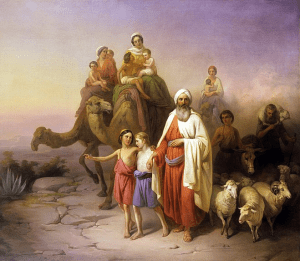 These verses that are covered in this lesson are among the most controversial and studied scriptures in word history. These describe the division between the Jews and the followers of Islam, which is ongoing issue in the world today. It also discusses the use of women in ways that most of us would find uncomfortable by today’s standards. Be sensitive to this in teaching this lesson, and try to protect from an wholly masculine lens when engaged in class discussions.
These verses that are covered in this lesson are among the most controversial and studied scriptures in word history. These describe the division between the Jews and the followers of Islam, which is ongoing issue in the world today. It also discusses the use of women in ways that most of us would find uncomfortable by today’s standards. Be sensitive to this in teaching this lesson, and try to protect from an wholly masculine lens when engaged in class discussions.
Recent Considerations
On 20 January 2022, the church released a new pamphlet, that urges Understanding Between Muslims and Latter-day Saints. This link includes links to the pamphlet as well as YouTube videos of Elders Bednar and Gong discussion the importance of religious freedom and religious tolerance. As Elder Bednar said: “We feel badly and misrepresented when a news report notes that someone who committed a grievous crime was a Latter-day Saint… In a similar way, to suggest that all Muslims are tied to grievous crimes here in the U.S. or elsewhere in the world is just as inaccurate and offensive to Muslims. Muslims disavow any such actions, just as Latter-day Saints do. Every major religion has extremists who misinterpret the teachings of their own religion or who seek to do wrong in the name of religion.”
In the spirit of this week’s lesson, consider:
How can I be a better member of the Church of Jesus Christ of Latter-day Saints by defending religious freedom for all?
How can support of those of other faiths help us to “To Be a Greater Follower of Righteousness”?
Ask rhetorically, then ask again:
The manual invites class members to share their impressions “and complete a sentence like the following: “Abraham taught me_______ ” or “Sarah taught me________ .”
In order to complete these sentences, a summary of Genesis 12-15, as well as Abraham 1-2 would be beneficial. As such, consider the following:
*Age: Modern culture places youth as a means of beauty. How can Sarah be seen as beautiful at the approximate age of 65? Derek Kidner, a British Old Testament scholar write that:
“Sarai’s sixties would therefore presumably correspond with our thirties or forties and her ninety years at Isaac’s birth with perhaps our late fifties.” Kidner, Genesis, Leicester & Downers Grove: InterVarsity Press, 1967, p 117
*Context: Abraham’s throwing Sarai “under the bus.”
Abraham was afraid for his life. Both he and Sarai were! They were both afraid of starving to death or being killed in the wilderness. When in trying circumstance, none of are likely to make perfectly righteous choice for survival. Have we not all been in difficult situations wherein we needed to do something creative or very difficult in order to survive? For example:
In Abraham2, 24-25 we even see that the Lord instructs Abraham to tell Sarai to … be less that wholly honest:
“Let her say unto the Egyptians, she is thy sister, and thy soul shall live.”
Abraham then tells Sarai that the Lord has told him that she should sacrifice herself. After all, she is Abraham’s half sister, and she is beautiful. If they arrive and she is taken into the king’s household—as concubine—(because it is naïve to think they she was simply kept there without harm)—then the Lord promises that Abraham’s life will be spared.
Professor Mary Evans puts it this way:
“It may be thought that Abram was careless of his wife’s safety and that the only thing that counted for her as a woman was her looks. However, the pair apparently saw themselves as fleeing from certain death in the Canaanite famine and assumed that Sarah’s unusual beauty meant that she was likely to be taken anyway. The only question was whether Abram himself could survive. As a husband he would not; as a brother he might.” – Mary J. Evans, “Women,” Dictionary of the Old Testament: Pentateuch, InterVarsity Press, 2003,. 897-904
*Consider this:
(?) Could Sarai have born children that were fathered by the Egyptian pharaoh or his sons?
We know that Sarai gave her servant Hagar to Abraham in order to fulfill the covenant of Abraham having seed. Jewish tradition teaches that Hagar was a princess – perhaps even the daughter of the Pharaoh, and was given to Sarai, saying “It is better that my daughter should be a servant in the house of such a woman than mistress in another house” (“Jewish Encyclopedia, Hagar”. Jewishencyclopedia.com)
(?) What does this teach us about the position of royalty within the bible? Does royalty mean protection and abundance?
(?) What does this mean to us? As members of “The royal house of Israel” – will we be protected or always live abundantly?
We know that Hagar fall pregnant with Abraham’s son and this son is named Ishmael.
We also know that Sarai’s name is changed to Sarah, and she too, finally bares a son, Isaac.
We know that Hagar is chased into the wilderness with her son.
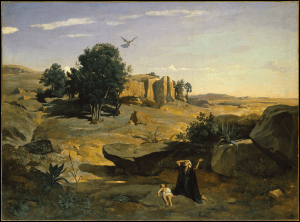 (?) What does this teach us about patience? What does this teach us about kindness and helping strangers? What does this teach us about trusting in the Lord? Keep in mind, Sarah was kept as a concubine for a time, and Hagar and her son nearly died of thirst and starvation. What does this teach us about trauma and those living with trauma today?
(?) What does this teach us about patience? What does this teach us about kindness and helping strangers? What does this teach us about trusting in the Lord? Keep in mind, Sarah was kept as a concubine for a time, and Hagar and her son nearly died of thirst and starvation. What does this teach us about trauma and those living with trauma today?
Back to the manual:
(?) “complete a sentence like the following: “Abraham taught me_______ ” or “Sarah taught me________ .”
Have a class member or members read Genesis 15:1–6 and Abraham 1:1–19. Considering these verses, and in line with the manual, ask, or ask a class member to prepare a statement in advance:
(?) How can we demonstrate our faith when our righteous desires are not yet fulfilled as we would like them to be?
(?) How has the Savior has supported you in a situations where you were not blessed with your desires as quickly as you would have liked or needed?
Abrahamic Covenant
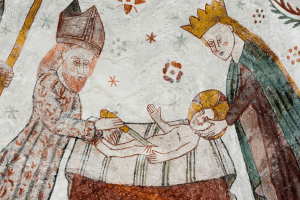 (?) Re-state the previous question: What does this mean to us? As members of “The royal house of Israel” – will we be protected or always live abundantly?
(?) Re-state the previous question: What does this mean to us? As members of “The royal house of Israel” – will we be protected or always live abundantly?
State: Though our circumstances might not appear “royal”, we are blessed by the Abrahamic covenant.
Have a class member read: Abraham 2:6–11
(?) What is promised in the Abrahamic covenant?
(bless all the faithful with truth, priesthood ordinances, exaltation, and eternal increase.)
Have someone read from the manual:
“The covenant God made with Abraham and later affirmed with Isaac and Jacob is of transcendent significance. … The Lord appeared in these latter days to renew that Abrahamic covenant. … With this renewal, we have received, as did they of old, the holy priesthood and the everlasting gospel. We have the right to receive the fulness of the gospel, enjoy the blessings of the priesthood, and qualify for God’s greatest blessing—that of eternal life” (“Covenants,” Ensign or Liahona, Nov. 2011, 87–88).
What are the ways these things are manifested to us personally today? (The Holy Ghost upon baptism is available to men and women, patriarchal blessings, temple initiatory. Keep in mind that Abraham’s “increase” was not limited to having biological children, but also when he left Egypt, he left with property enough to survive and thrive.)
(?) Consider: what might “eternal increase” include?
(?) Consider: How can women make use of the priesthood blessings of Melchizedek in their lives? Must a male priesthood holder always be present?
(?) Consider: How can we be better at not judging others for their individual circumstances?
(?) Consider: How can we each be a greater follower of righteousness in own own individual circumstances?
January 23, 2022
Sacred Music Sunday: The Lord Is My Light
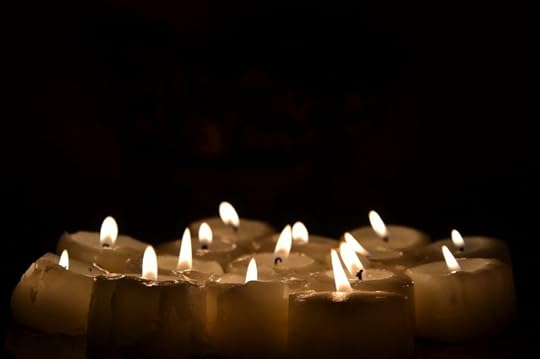
January and February are hard for me. I live in the northern hemisphere, and I’m extremely solar powered. By the time January hits, I’m just done. It’s been dark for months, and the gentle happy glow of Christmas is over. I’m tired, sluggish, cold, unmotivated, and in physical pain. Even high doses of injected vitamin D prescribed by my doctor only barely take the edge off. I just have to push through until March when the sun comes back and my body forgives me for subjecting it to winter.
Descriptions of Jesus as the light of the world resonate with me for this reason. Just as the sun illuminates the darkness and gives me hope and joy and relieves my physical pain, the Son of God illuminates the spiritual darkness and gives me hope and joy and relieves my metaphysical pain.
And when I’m feeling spiritually down, I can remind myself that the Son might be harder to see at some times, but March is coming. The Lord is my light.
January 22, 2022
Guest Post: Eve Creation
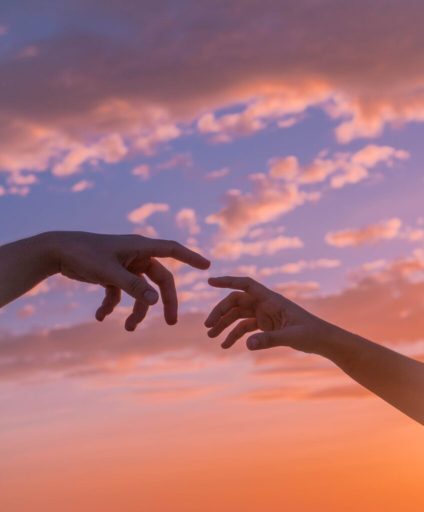
Guest Post by Tina. Tina enjoys nature, art, and reading. She is nearly complete with a graduate degree in trauma informed teaching and loves asking questions to learn more about the world.
One January a few years ago I listened in horror as the sacrament meeting speaker, while relating the story of his grandpa’s life, repeatedly stated that his grandma gave up everything important to her to support her husband in his career. This speaker seemed to have internalized the idea that women exist to support men. That the speaker was a 14-year-old boy gave me pause to soberly consider how this boy will treat girls and women as he grows to adulthood.
Where does the view of women existing primarily to support men originate? I suggest that we look at our interpretation of the Eve and Adam creation story. Christianity typically interprets Genesis 2 as Adam being created, God declaring that it is not good for Adam to be alone, and then taking one of Adam’s ribs to form Eve. For hundreds if not thousands of years, this interpretation has been used to support male headship, male priesthood, and female secondary status. After all, in this telling, Adam is the main character and Eve is derivative of and subordinate to a man.
This interpretation and assignment of my worth and status as a female permeated my experience and psyche as I grew up in the church. The effects of this interpretation continued well into adulthood. “Are women fully human who exist independently of men?” An answer of ‘no’ supports the paradigm that women exist to support men. It is this answer that justifies thousands of years of female subjugation.
The answer to this question has long been, and still is, debated by men. It is the question underlying the paradigms of how women and men relate to each other in society and especially in the church. It is the question underlying all other questions: Can women vote? Can women do certain jobs? Can women go to college? Can women serve on juries? Can women work if they are pregnant? Can women have bank accounts in their own names? Does a woman’s body fully belong to her or is she an object called walking pornography or a barn that must be painted before a man is willing to buy, excuse me, marry her? Do her life choices fully belong to her or must she be continually reminded that the choice has been made and that there is one acceptable path of wife and mother? Is a woman human enough to pass out towels, witness a baptism, hold her own baby while they are blessed, pass sacrament trays to a congregation, pray in General Conference, or hold an office in the priesthood of God, Elohim, who consists of both the Eternal Father and the Eternal Mother?
Is any person who is a ‘she’ fully human?
Yes! I mean, I think so. Except for all those times when I am told by my parents, the church and sometimes society, implicitly or bluntly, that I am deformed male; not quite human. Over the years as I tried to hold my ground and stand in my truth, a quiet little voice sometimes wondered if what they said could be true. And so I spent years stunting my development by squeezing my thoughts, choices, and physical body into a box of parental, church, and societal female acceptability. Eventually the slowly simmering heat from the pressure squeezing me inside the box reached a point where I burst into a flame. My mental health in tatters, the flame reduced my psyche to ashes over the following months.
Shattered into nothingness, I cried out for help. Wrapped in comfort by the Divine Feminine, I have spent the last several years rising from the ashes like a brilliant Phoenix infused with new life. I now intend to encourage others by sharing that it is possible to heal from woundedness.
Reexamining our collective and personal interpretations of Eve’s creation is a foundational place to begin healing because the interpretation of that story is where the woundedness originates. We have only a portion of the creation account. This story was passed along orally during a time when there is evidence that partnership societies existed. By the time this account was written, however, the dominance of men over women in the structure known as patriarchy was well established. The story, which likely changed over time, was recorded under the paradigm that viewed women as secondary. It is this view that persists today. And yet, I do not see how the current prevailing interpretation regarding Eve’s creation is supported by the fragment of the story we do have. In Genesis 1, both female and male are created at the same time by God. In Genesis 2, the ‘adam’ is not designated either male or female; ‘adam’ in Hebrew means human. Some scholars and theologians believe that this first human was andrognynous. From this perspective, the female was not taken from a man’s rib (side is a more accurate translation) but that this andrognynous human was divided from its side into two individuals.
We all have both female/male, yin/yang energy within us. To become more fully developed, we nurture these energies inside ourselves, our families, churches, and communities to full expression and balance. Eve was not created because Adam needed an accessory. At the same time, it is true that we need each other. However, women must be recognized as individuals fully human in their own right. Some men, especially in the church, are uncomfortable hearing the painful experiences of women; it seems to offend or scare them. If men have been told they are special for being men but now women are special too, where does that leave them? Perhaps they do not yet know that they are fully human too.
It is time to return to partnership where all people are fully human and have opportunities to grow. For too long we have been frozen in a place of valuing only the masculine. Awareness of the Divine Feminine is waking up in many people. It reminds me of the part in The Lion, The Witch, and the Wardrobe where the inhabitants of Narnia see the snow melting and the Beaver says:
“Aslan is on the move- perhaps has already landed.” And now a very curious thing happened. None of the children knew who Aslan was any more than you do; but the moment the Beaver had spoken these words everyone felt quite different.”
I see the snow melting; I see stirrings for humanity to move forward and I can not help but say that She is on the move. Perhaps She has already landed.



